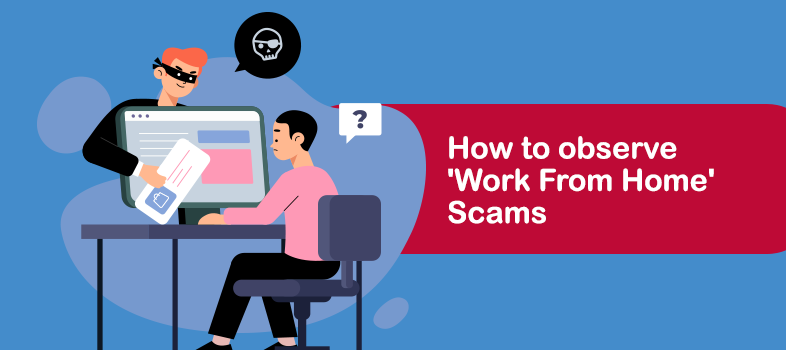Even before COVID 19 pandemic knocked our doors, work from home was trending as the new normal. It is surely becoming more & more usual as people can observe the merits of being at home & yet working. This helps us with the travelling related hassles as you do not have to move out. At the same time, it’s important to keep the pros and cons under consideration as well. This will help to put risks at bay. We often hear about work from home scams emerging out of nowhere. If you unintentionally lend your personal details to a scammer, you face the risk of losing your money.
Here are the ways to protect yourself against plots & scams:
How to identify a scam?
Nothing can be better than acquiring knowledge about the work from home projects instead of simply giving in. So, it’s best to closely conduct research on legitimate work from home jobs and then submit your application. With every work-related proposal, you get a clearer pattern of the scams.
This will definitely make it easier to spot the dark activities & not invest in unnecessary engagements. Now, you will clearly start to fathom the sameness of their pitches as you apply for your home office jobs.
Use Your Common Sense
When we discuss business opportunities, it’s very important to evaluate its profit angle from the company’s perspective. Try to examine how much money will be good to contribute to the revenues. In fact, no scam will ever announce their job options as illegitimate so you will have to keep your eyes open.
Wherever things look too good to be true, applying common sense is not just enough. So beware!
Keep Your Emotions under control
Scammers always like to play with your emotions to make you take hasty decisions. When you’re desperately looking for work, you tend to go illogical in your actions. Finding potential work from home opportunity is not easy, so act patiently.
Do some good Homework
Do not be fully sure of any project that comes your way, Build a habit to doubt everything you see and conduct in-depth research on it. Go deep into the physical location, contact details, online reviews etc. You may or may not retrieve valuable information but it can surely present a primary angle to your research.
Be cognizant of known scammers
A few scammers are already existent in the digital space. They are always coming up with newer ways to cheat. Some of the opportunities you should ideally avoid are quoted as under:
- Direct sales or multilevel marketing
- Pyramid schemes
- Business start-up kits
- Home assembly/envelope stuffing
- Stock trading systems
- Directories of telecommuting jobs or businesses
- Online surveys
Sometimes, tricksters use a whole website dedicated to offer work-at-home scams and label them as “legitimate” work-at-home jobs, which, of course, are not legitimate.
In addition, avoid opportunities advertised on search engines and unsolicited emailers.
You can also turn to traditional channels for home-based work jobs such as job boards, job search engines, and newspapers. Or you could also visit a company’s employment website and see for offered roles currently. Go and check out free reliable resources that list legitimate companies offering work-from-home jobs by every dedicated industry.
Note: Never agree to pay for opportunities. That’s the worst to encourage scammers/fraudsters in their endeavour.

